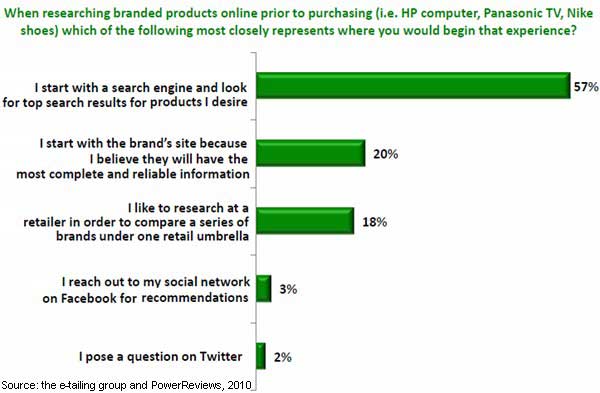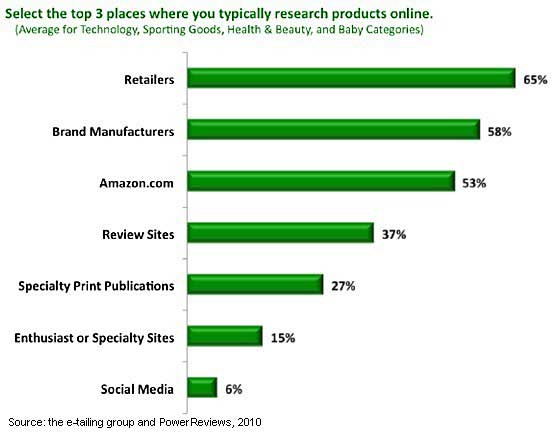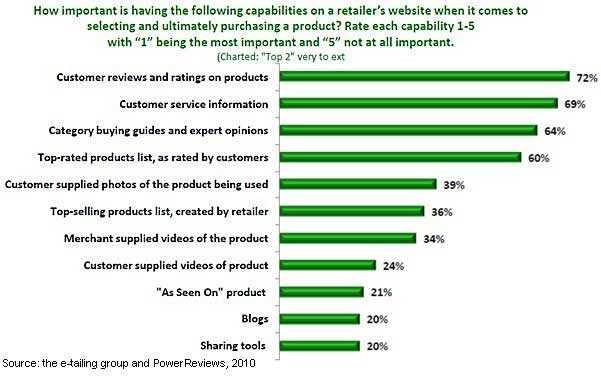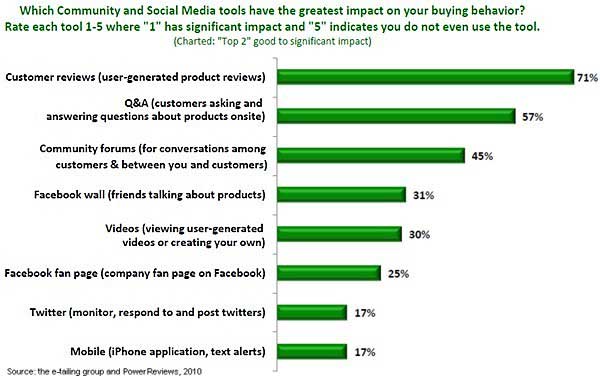Online research is central to consumer shopping behavior: 50% of online shoppers say they conduct research online for at least one-half of their purchases, and 64% consistently read online reviews prior to making product purchase decisions, according to an e-tailing group and PowerReviews study slated for release in early May.
Online shoppers prefer research conducted on the Web because it saves them time and increases their confidence in purchase decisions, the study found:
- 46% say they save much more time and 33% save somewhat more time doing their own research online vs. traditional in-store research.
- 46% are much more confident and 37% are somewhat more confident about making a purchase decision when they conduct research online vs. speaking to a knowledgeable salesperson in-store.
- 45% are very satisfied and 37% are somewhat satisfied with the product and category information they typically find when researching online prior to shopping.
Below, other findings from the 2010 Social Shopping Study by the e-tailing group and PowerReviews, which surveyed consumers on their preferences regarding online product research and customer reviews.
Most Consumers Start With Search Engines
Nearly six in ten (57%) online shoppers say they start online research for branded products with a search engine; 20%, however, start with the brand's site because they expect it to have the most complete and reliable information.

Fewer shoppers turn to social networking sites such as Facebook (3%) and Twitter (2%).
Typical Research Destinations
Asked to select the top 3 places they typically research products online, 65% of online shoppers cite retailer sites, 58% cite brand sites, and 33% cite Amazon. Just 6% cite social media sites.

Reviews Influence Selection and Purchase
Regarding website capabilities or features that influence product selection and purchase decisions, customer reviews and ratings are the most important among the shoppers surveyed (72%), followed by customer service information (69%), and third-party buying category guides and expert opinions (64%).

Other user-generated content, such as top-rated product lists (60%), customer-supplied photos of products (39%), and customer-supplied videos of products (24%), are also considered important.
Among the social media tools that have a "good to significant impact" on buying behavior, consumer reviews (71%), Q&A (57%), and community forums (45%) are cited most by online consumers.

Nearly one-third of online shoppers (31%) cite Facebook wall conversations about products, and 25% cite Facebook fan pages.
Looking for real, hard data that can help you match social media tools and tactics to your marketing goals? The State of Social Media Marketing, a 240-page original research report from MarketingProfs, gives you the inside scoop on how 5,140 marketing pros are using social media to create winning campaigns, measure ROI, and reach audiences in new and exciting ways.
Use of Online Reviews and Ratings Increasing
Online shoppers are taking more time to read reviews before making purchase decisions: 64% spend 10+ minutes reading reviews, compared with the 50% who did so in 2007.
Shoppers are also reading more reviews to gain confidence in those purchase decisions: 39% say they read eight or more reviews to be confident in judging a product (vs. 22% in 2007) and 12% say they read 16+ reviews (vs. 5% in 2007).
Trust in Consumer Reviews
Over one-half (57%) of online shoppers say they trust customer reviews, but only to corroborate other information. Some 35%, however, think they might be biased and only 6% trust reviews completely and more than other source.
Among the factors that degrade trust in reviews, online shoppers cite the following:
- Not enough reviews: 50%
- Doubts that they are written by real customers: 39%
- Lack of negative reviews: 38%
- Positive reviews always positioned first: 25%
- Lack of information about reviewer: 23%
About the data: Findings are from 2010 Social Shopping Survey, conducted by the e-tailing group and PowerReviews, which surveyed over 1,000 consumers who shop at least four times per year and spend $250+ annually shopping online. The survey was conducted from March 19 to 25, 2010.



